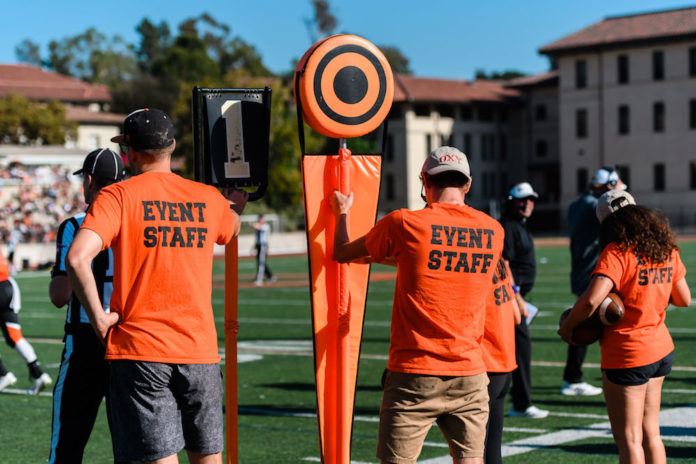
Students who earn their work study awards by working in games management are often the ones who set up and run sports games at Occidental. Michael Wells, sports information director, said the reality of Division III college sports is that around 95 percent of the work is conducted by students. They work a variety of jobs throughout the games, such as public announcing, working the shot clock and logging team statistics.
“Describing the games management at Occidental — like other Division III and other SCIAC schools — is you would typically have anywhere from five to 15 student workers that are keeping the score book, doing the shot clock, doing the game clock, mopping the floors, being ball runners for football for soccer, doing the statistics for water polo,” Wells said.
According to Wells, the majority of students employed by games management are athletes themselves, and the job is the largest employer of students on campus. Wells said around 40–50 students are hired at a time in order to accommodate for scheduling conflicts and to make sure that the multitude of athletic events are all staffed.
According to Wells, games management is a unique job which offers a more intense and upbeat work environment — public announcing and clock keeping are accompanied by a rush similar to that of a performance.
“I think it’s a wonderful environment to earn your work study award. It’s fun, you’re at a sporting event where you might otherwise be anyway, the only difference is you get to get paid,” Wells said. “You’re not sitting at a desk somewhere, answering phone calls for six hours on a Tuesday, right? You might be working a championship game.”
According to Wells, Occidental students are the best games management workers he has seen from any Division III institution. He praised their work ethic, attitude and professionalism.
“Most of the time, you wouldn’t notice [that] it’s students behind the scenes, other than looking over and seeing the students there, because they do a terrific job,” Wells said. “They’re extremely competent, and they have wonderful disposition and attitude towards doing a good job.”
Kailen Shinmoto (junior) works in games management as part of his work study award, and although he is one of the few non-athlete student workers, sports have always been a big part of his life. Shinmoto said he would often find himself attending Occidental sports games and figured he might as well get paid for it, making games management the perfect fit. According to Shinmoto, student workers are able to log a lot of hours from the job. They normally work two to three games a week, with each game logging around three hours.
Using basketball games as an example, Shinmoto said the different tasks that need to be accomplished before the game require workers to show up about an hour before the game starts.
“With basketball, we’d have to bring the stands out, set up the railings on the stands, put up the side baskets to allow the stands to come out,” Shinmoto said. “Then we’d also have to bring out all the rugs, the chairs, the score keeping table. We make sure we turn on all the electronics, the music’s working, the PA is working, score keeping, the shot clock is resetting.”
Shinmoto said after around 30 minutes of pre-game set up, the student workers take a short break and are then assigned to specific duties during the game. This can range from administering the shot clock, mopping the floors and making public announcements, according to Shinmoto. Due to his background playing basketball, Shinmoto said he often works with the shot clock, which can be a high-pressure job.
JP Flores (junior), another student worker in games management, said that the game involves a lot of work and communication. Flores said the process of setting up for a soccer game involves organizing the goal posts, weights, flags and starting lineups from both teams. In addition, student workers livestream and record games, as they send over the film to the coaches, according to Flores.
Both Shinmoto and Flores spoke about the skills they gained by working in games management. Shinmoto said the job is especially unique because there are many different jobs students have the opportunity to work, allowing them to gain a multitude of skill sets such as filming games, working with scoreboards, doing stats on a computer and making announcements.
According to Flores, the job also involves leadership, community and collaboration. Upperclassmen often train new hires and pass on their knowledge regarding the various jobs present within different sporting events, Flores said.
“A common motto that we say is ‘Games management for life,’” Flores said. “I had trouble with the livestream, and I actually called an alumni from a year ago, asking them for help because I didn’t know how to do something.”
Wells said the community amongst the games management workers is amazing to witness, as students with different majors form strong bonds over their shared interest in sports or experience as student athletes themselves.
“It’s been amazing … not just for me to have certain mentoring, and now friendship relationships with a lot of these students when they graduate, but [for] those students to have relationships amongst themselves,” Wells said. “It’s a strong community of people that really enjoy one another.”
![]()


































